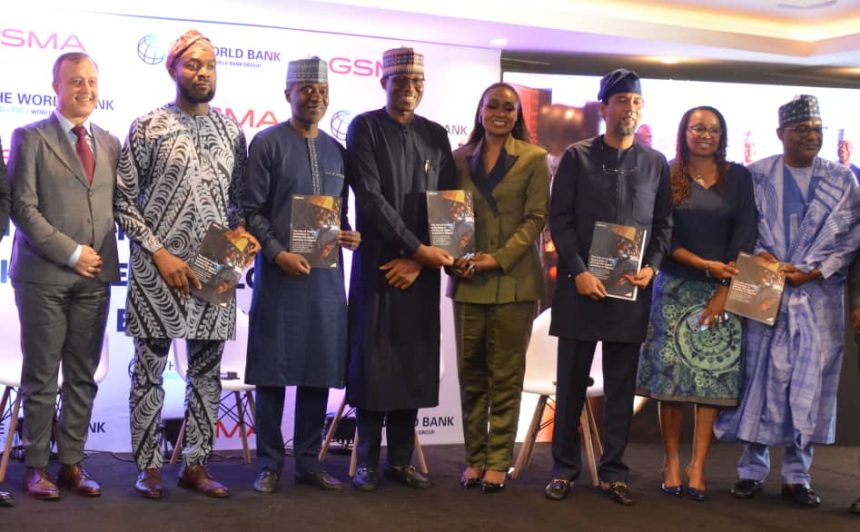L-R: Juergen Peschel, Chief Executive Officer, 9Mobile; Dr. Bosun Tijani, Honourable Minister of Communications, Innovation, & Digital Economy; Dr. Aminu Maida, Executive Vice Chairman, Nigerian Communications Commission; Gbenga Adebayo, Association of Licensed Telecommunications Operators of Nigeria (ALTON); Bella Disu, Executive Vice Chairperson, Globacom; Karl Toriola, Chief Executive Officer, MTN; Angela Wamola, Head of Sub-Saharan Africa, GSM Association (GSMA); Ibrahim Dikko, Chief Executive Officer, Backbone Connectivity Networks Nig. Ltd.; at the GSMA Nigeria Digital Economy Report launch in Abuja on May 9 2024.
...Advocates Collaborative Actions To Boost Digitalisation, Support Economic Growth
The Telecoms sector’s contributions to Nigeria’s Gross Domestic Products (GDP) stood at 13.5%, a global organization, GSMA report has indicated.
In the report tagged: ‘The role of mobile technology in driving the digital economy in Nigeria’, GSMA also said the telecom sector’s contribution to Nigeria’s overall economic activity is much greater, estimated at 33 trillion NGN in 2023, with 2.4 trillion NGN in tax revenue contributions with 2.4 trillion NGN in tax revenue contributions.
Angela Wamola, Head of Sub-Saharan Africa at the GSMA, who stated during a stakeholders meeting in Abuja on Thursday, also advocated collaboration among industry players for the overall growth of the nation’s economy.
She said: “High-speed connectivity is the bedrock of any digital nation, and the Nigerian government recognises the mobile industry’s role in laying key foundations on which digital transformation is built.
“It is estimated that, in 2023, the telecoms sector was contributing 13.5% to the GDP of Nigeria. Considering the direct and indirect contribution of the mobile ecosystem, as well as the productivity impact throughout the economy, the telecom sector’s contribution to Nigeria’s overall economic activity is much greater, estimated at 33 trillion NGN in 2023, with 2.4 trillion NGN in tax revenue contributions.
“High-speed connectivity is the bedrock of any digital nation, and the Nigerian government recognises the mobile industry’s role in laying key foundations on which digital transformation is built. Future policies should be geared towards reducing the cost and complexity of infrastructure rollout to encourage investment and boost the adoption of mobile broadband. The impact of such actions would go far beyond mobile, driving productivity gains across the economy and creating millions of new jobs in Nigeria.”
According to her, the Mobile Network Operators (MNOs) are committed to investing to support the realisation of the digitalisation ambitions that will unlock economic growth and development in the country.
“Navigating a complex operating environment
To unlock these economic opportunities, connectivity and mobile financial services are crucial foundations.
“The GSMA’s report emphasises that while 29% of Nigerians are regularly using mobile internet, there remains untapped potential, as 71% are not accessing these services on a regular basis. An improved policy environment has the potential to help the industry boost coverage and adoption, resulting in 15 million additional internet users by 2028. However, the sector faces challenges to infrastructure deployment.
“Complex and costly process of securing Rights of Way (RoW) significantly increases the time and costs associated with rolling out infrastructure.
“The complex tax environment in Nigeria, providing for high and increasing costs of tax compliance because of the complex and overlapping tax structure within the country.
Increasing costs are making it difficult for the industry to maintain sustainable levels of investment.
“The primary driver of this has been increases in the cost of power for sites due to the rapid increases in the price of fuel, increased government fees and levies, and increased demand for forex, in an import-dependent environment, due to contractual obligations for network infrastructure and services that are denominated in USD”.












